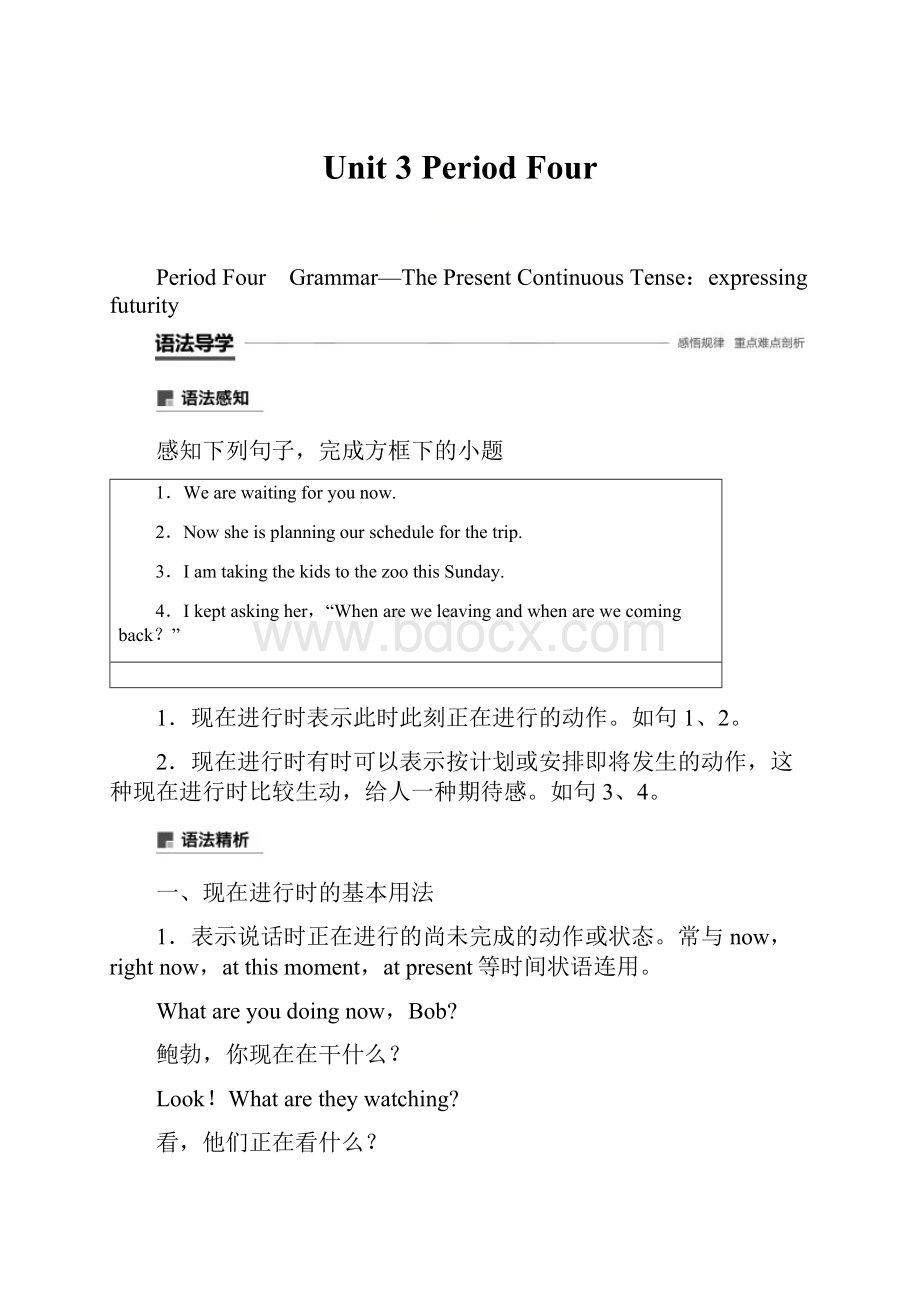Unit 3 Period Four.docx
《Unit 3 Period Four.docx》由会员分享,可在线阅读,更多相关《Unit 3 Period Four.docx(15页珍藏版)》请在冰豆网上搜索。

Unit3PeriodFour
PeriodFour Grammar—ThePresentContinuousTense:
expressingfuturity
感知下列句子,完成方框下的小题
1.Wearewaitingforyounow.
2.Nowsheisplanningourscheduleforthetrip.
3.IamtakingthekidstothezoothisSunday.
4.Ikeptaskingher,“Whenareweleavingandwhenarewecomingback?
”
1.现在进行时表示此时此刻正在进行的动作。
如句1、2。
2.现在进行时有时可以表示按计划或安排即将发生的动作,这种现在进行时比较生动,给人一种期待感。
如句3、4。
一、现在进行时的基本用法
1.表示说话时正在进行的尚未完成的动作或状态。
常与now,rightnow,atthismoment,atpresent等时间状语连用。
Whatareyoudoingnow,Bob?
鲍勃,你现在在干什么?
Look!
Whataretheywatching?
看,他们正在看什么?
2.表示目前一段时间正在进行的动作。
现在进行时可表示目前一段时间内在做某一件事,但此时此刻未必正在进行的动作。
Georgeisworkingonanewbookaboutstoriesinschools.乔治在写一本关于校园故事的新书。
3.表示反复性、一贯性动作的用法。
现在进行时与always,constantly,allthetime等副词(短语)连用时,可表反复性、一贯性动作,常用来表示赞扬、生气、不满、厌恶等感情色彩。
Heisalwaysaskingformoney.他老是要钱。
Sheisconstantlychanginghermind.
她总是改变主意。
二、现在进行时表将来的用法
1.动词come,go,arrive,leave,start,begin,return等的现在进行时可以表示将来的动作,常有“意图”“安排”或“打算”的含义。
这种用法比较生动,给人一种期待感。
它常表示最近或较近的将来会发生的动作。
Theyarecomingherethisafternoon.
他们今天下午来这儿。
Whenareyoustarting?
你们什么时候动身?
2.除上述动词外,还有一些动词也可用现在进行时表示将来,如do,buy,meet,have,play,spend等,此时句中一般要有表示将来的时间状语。
WhatareyoudoingnextSunday?
下星期天你打算干什么?
Mymotherisbuyingmeabikesoon.
我妈妈不久将给我买一辆自行车。
I’mmeetingyouafterclass.下课后我要见你。
3.偶尔也表示较远的将来。
WhenIgrowup,I’mjoiningthearmy.
我长大了要参军。
4.现在进行时也可用在时间、条件或原因状语从句中表示将来。
Iftheyarenotgoing,Iwon’tgo,either.
如果他们不去,我也不去。
三、其他几种表示将来的结构
1.will/shalldo表达单纯的将来时,是对未来事情发生的一种“预见性”。
可用于说话时才想到或决定的事。
will用于各种人称,而shall仅用于第一人称。
—I’msorry.Iforgottoposttheletterforyou.
—Nevermind.Iwillpostitmyselfthisafternoon.
——对不起,我忘了给你寄信了。
——不要紧,今天下午我自己去寄。
注意:
表示事先未经过考虑的打算、计划,是在说话时才想到或决定的事,即临时起意,这时通常用will。
—Whereisthetelephonebook?
—I’llgoandgetitforyou.
——电话号码簿在哪里?
——我去给你拿。
2.begoingtodo用来表示近期或事先考虑要做的事情,以及有迹象表明将要发生的事。
Lookatthoseblackclouds;there’sgoingtobeastorm.瞧那些乌云,眼看要有暴风雨了。
3.betodo表示预定、按计划或安排将要发生的动作。
Themeetingistotakeplaceearlytomorrow.
会议明天一早召开。
4.beabouttodo表示马上就要发生的事,不与具体的时间状语连用,但可用于句型beabouttodo...when...“即将做某事,就在这时……”。
Bequiet!
Thefilmisabouttostart.
安静!
电影马上开始。
Shewasabouttoleavewhensomeguestscame.
她刚要离开,这时来了一些客人。
5.一般现在时可表示按时刻表、日程表的安排所发生的将来的动作,也可用于状语从句中表示将来。
Thenextplaneleavesat6pm.
下一班航班下午6点起飞。
Ifitisfinetomorrow,wewillgototheGreatWall.
如果明天天气好,我们就去长城。
单句语法填空
1.Mywashingmachineisbeingrepaired(repair)thisweek,soIhavetowashmyclothesbyhand.
(2018·天津)
2.—Hi,let’sgoskating.
—Sorry,I’mbusyrightnow.Iamfilling(fill)inanapplicationformforanewjob.(2014·北京)
3.Hurryup!
MarkandCarolareexpecting(expect)us.(2013·北京)
4.Onlywhenheapologizes(apologize)forhisrudenesswillIspeaktohimagain.(2013·江西)
5.“Themomentiscoming(come)soon,”hethoughttohimself,waitingnervously.
(2012·湖南)
6.—Ihearyouareworking(work)inapub.What’sitlike?
—Well,it’sveryhardworkandI’malwaystired,butIdon’tmind.(2011·江苏)
7.Thatpieceofmusicsoundsquitefamiliar.Whoisplaying(play)thepianoupstairs?
(2011·重庆)
8.I’llgotothelibraryassoonasIfinishwhatIamdoing(do).(2011·辽宁)
Ⅰ.单句语法填空
1.Thestudentsareplaying(play)gamesintheparkatthemoment.
2.Thetelephoneisringing(ring).Wouldyouanswerit?
3.—MrJordan,wewanttohearyouropinionaboutthecurrentNBAgames.
—OK,Iamcoming(come)tothat.
4.Assoonashecomes(come)back,Iwilltellyou.
5.Usuallythenewtermstarts(start)onAugust29th.
6.—DidyoutellJuliaabouttheresult?
—Oh,no,Iforgot.Iwillcall(call)hernow.
7.Youaretohand(hand)inyourcompositionsafterclass.
8.Becausetheshopisclosing(close)down,everythingissoldathalfprice.
Ⅱ.完成句子
9.HeisleavingforLondonintwohourstomeetwithhismanager.(leave)
他两小时后将赴伦敦和经理会面。
10.WeareflyingtoShanghainextFridaytoattendanimportantmeeting.(fly)
下周五我们将乘飞机去上海出席一个重要的会议。
11.—Whatareyougoingtodotonight?
—I’mgoingtowatchthebaseballgameonTV.(watch)
——今晚你打算做什么?
——我打算看电视上的棒球赛。
12.Asthefestivaliscoming,peoplearebusypreparingforit.
随着节日即将到来,人们在忙着为它做准备。
13.Wewereabouttoleaveforhomewhenwewereaskedtopracticesinging.(leave)
我们正要动身回家,就在这时被叫去练歌。
Ⅲ.语法填空
LisahasbeeninBeijingforthreeyears.Althoughsheknowslittleaboutthecity,sheisabout14.tobuy(buy)ahousehere.Andherparents15.arecoming(come)toseeherfromEnglandtwodayslater.16.Atpresent,sheisanEnglishteacherandherstudentsarevery17.friendly(friend)toher.Whenshehastrouble18.speaking(speak)Chinese,herstudentsareallgladtohelpher.
She19.goes(go)toworkonfooteverymorning.BecauseBeijingisfullofpeopleandcars,walkingis20.faster(fast)thantakingabus.Inthepastfewyears,Beijing21.haschanged(change)greatly.Theonlythingthattroublesheristheairpollution,sosheoftenwearsamask(口罩)toprotect22.herself.Shehopesthateffectivemeasureswill23.betaken(take)tosolvetheproblem.
基础巩固
Ⅰ.单句语法填空
1.Don’tupsethim.Heisreading(read)abook.
2.I’llgocampingifitis(be)finetomorrow.
3.Johnisleaving(leave)forShanghaibyplanetomorrow.
4.Weareflying(fly)toBeijingnextFridaytojoininanactivity.
5.I’mnotgoingouttonight.Iamstaying(stay)athome.
6.Theweatherforecastsaysthatitisgoingtobe(be)warmtomorrow.
7.Pleasecometoseemewhenyouare(be)free.
8.Myplanetakes(take)offat8:
35,soIhavegottohurryup.
9.Putonyourcoat.Iamtaking(take)youtoseethedoctor.
10.Theconcertisabouttobegin(begin).You’dbetterkeepquiet.
Ⅱ.完成句子
11.I’llcallonsomeofmyoldfriendswhileIamstayinginShanghai(待在上海).
12.Catherineiswaitingforyou(正在等你)downstairsatthemoment.
13.Whenareyouleavingfor(你动身去)thatmountainvillageforafriendlyvisit?
14.Technologyischanging(正发生变化)sorapidlythatwehavetoworkhardtokeepupwithit.
15.Iwasabouttogoout(正要出去)whenmyunclearrived.
16.Theyaretakingtheirchildren(将带他们的孩子们)tothezoothisSunday.
能力提升
Ⅲ.完形填空
Travelerstonewcitiesareoftentoldtostarttheirtripwithabustour.Thethinkingisthattheycanthenreturntotheplacesthat17them.It’snottrue!
Whatyouseefromthe18ofamovingbusis19.It’sdifferentfromtherealsights,sounds,and20outside.
Beadventurous(冒险的)!
Thebest21toexperienceanyplaceisonfootandwithcompletelynotravelplan.22gowhereveryourfeetandyourinterests23you.Youfinallywillgettothe24placesthatareonthebustour—themuseums,cityhall—butyouwillhaveseenmuchmore.Youwillhave25thepresentlifeofthecity.
“ButwhatifIgetlost?
”peoplemightask.Nooneevergets26lostinabigcity.Atlast,youcanfindyourwaybacktoa(n)27place.Ifitmakesyouafraidofbeing“28”,justfindataxiandgobacktowhereyoustarted.However,the29thingscanhappenifyouarelost.Youcan30atacafétositandrelax.Youcanaskthelocal(当地的)peopleatthenexttablefordirections.And31theydon’tspeakyourlanguage,yourtripbecomesmoreinterestingbecauseofthe32.Herearetwomorewaystohelpyou.Knowbeforeyougo.33afewhoursbeforeyourtriplearningaboutthehistoryandcultureofyourdestination(目的地).
Movearoundlikea34.Usethesubwayandbusesofthecitythatyou’re35.You’llnotonly36money,butyou’llalsolearnhowpeoplereallylive.
语篇解读 你会很随意地而且很冒险地步行去新的城市旅行吗?
采纳本文的建议,相信你一定会有许多意想不到的收获。
17.A.helpedB.concerned
C.interestedD.satisfied
答案 C
解析 他们的想法是,这样他们就能够返回到他们感兴趣的地方了。
18.A.insideB.front
C.backD.center
答案 A
解析 此空与第四个空后的outside相呼应。
你从行驶的公共汽车里所看到的景色是不真实的。
它不同于外面真实的风景、声音和气味。
19.A.realB.true
C.unrealD.common
答案 C
解析 句意参考上题解析。
unreal不真实的。
20.A.viewsB.cities
C.townsD.smells
答案 D
解析 能与sights,sounds相并列的只有smells,故选D。
21.A.useB.way
C.groupD.voyage
答案 B
解析 体验任何地方最好的方式是步行。
故选B。
22.A.JustB.Never
C.HardlyD.Especially
答案 A
解析 仅仅去你的脚和兴趣带领你去的地方。
just仅仅;never从不;hardly几乎不;especially特别地,尤其地。
23.A.leadB.move
C.tellD.help
答案 A
解析 句意参考上题解析。
lead带领。
24.A.differentB.wrong
C.rightD.same
答案 D
解析 你最终会到达与乘公共汽车旅行相同的地点。
25.A.leftB.felt
C.livedD.led
答案 B
解析 通过这种方式你会感受到城市现在的生活。
26.A.terriblyB.possibly
C.hopelesslyD.finally
答案 C
解析 没有人会在大城市里无可救药地迷路。
根据下文可知,你可以找到方法回到原来出发的地方。
hopelessly绝望地;无可救药地。
27.A.unknownB.well�known
C.strangeD.familiar
答案 B
解析 最后,你可以找到你的方式回到一个众所周知的地方。
well�known众所周知的,符合语境。
unknown不为人所知的;strange奇怪的;familiar熟悉的。
28.A.lostB.decided
C.leftD.went
答案 A
解析 如果你害怕走丢就找一辆出租车,让它带你回到出发的地方。
29.A.worstB.hardest
C.nicestD.happiest
答案 C
解析 由下文看,迷路后你可以到路边的咖啡馆放松休息,询问当地人正确的路线,从而使你的旅行变得难忘,故此处指如果迷了路也会有好事情发生。
30.A.reachB.get
C.riseD.stop
答案 D
解析 迷路后你可以在一家咖啡馆停下来并坐下休息。
31.A.incaseB.asaresult
C.infactD.evenif
答案 D
解析 即使他们不会说你的语言,你的旅行也会因为这次经历而变得更加有趣。
evenif即使,符合语境。
incase以防,万一;asaresult结果;infact事实上,实际上。
32.A.experienceB.conversation
C.talkD.trip
答案 A
解析 句意参考上题解析。
experience经历。
33.A.TakeB.Spend
C.PayD.Use
答案 B
解析 旅行之前花费几个小时了解你的目的地的历史和文化,spendtime(in)doingsth.意为“花费时间做某事”。
而take指花费时间时常用句型:
Ittakessb.sometimetodosth.。
pay只能指花费金钱,不指时间。
34.A.graduateB.tourist
C.nativeD.foreigner
答案 C
解析 像当地人一样四处走动。
native当地人。
35.A.seeingB.visiting
C.goingD.walking
答案 B
解析 使用你正在游览的那个城市的地铁和公共汽车不仅省钱,而且还可以了解当地人的真实生活。
故选B。
36.A.organizeB.bend
C.saveD.flow
答案 C
解析 乘坐地铁和公交等公共交通工具肯定是比较“节省”开销的,故用save。
organize组织;bend弯腰;flow流动。
Ⅳ.语法填空
DearToby,
Thankyouverymuchforyourletter.Yourtripsounds37.(excite)!
Ican’twait38.(see)whatAfricaislike.Eversincemylastlettertoyou,I39.(have)aninterestingexperienceofmyown.Thismonth,mymotherandItook40.flighttoDunhuang.Thedeserttherewasreallyamazing.Ifound41.(I)veryexcitedbecausethiswasthefirsttimeI42.(see)acamelsoclose.Wehadhopedthatwewouldseesomeotherwildlifeinourtrip,but43.(sad)wedid